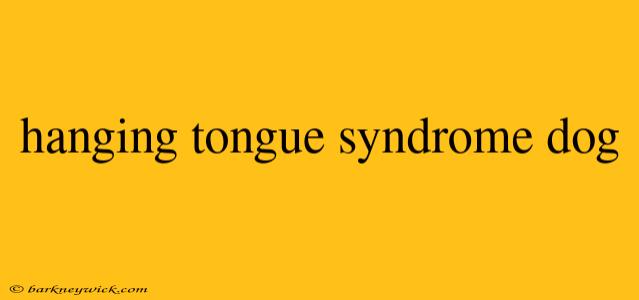Hanging Tongue Syndrome in Dogs: Understanding the Cause and Finding Relief
Remember the time I saw a dog with its tongue hanging out, seemingly unable to pull it back in? It was at the park, and I couldn't help but feel concerned. The poor pup looked distressed, and I wondered if there was something I could do to help. It turns out, that dog was likely suffering from a condition called Hanging Tongue Syndrome.
What is Hanging Tongue Syndrome in Dogs?
Hanging Tongue Syndrome (HTS), also known as "dropped tongue," is a condition where a dog's tongue hangs out of its mouth, seemingly unable to retract it. While it may look alarming, HTS is usually not a painful condition.
In my opinion, it's important to understand the underlying cause of HTS to determine the best course of action.
The Causes Behind a Dog's Droopy Tongue
While it's not always clear why a dog's tongue might hang out, there are several possible causes:
- Neurological Conditions: This is often the main culprit behind HTS. Conditions like cranial nerve damage (specifically affecting the hypoglossal nerve responsible for tongue movement), stroke, or brain tumors can lead to muscle weakness in the tongue, preventing it from retracting.
- Congenital Malformations: Some dogs are born with abnormalities in their tongue muscles or jaw structure, making it difficult for them to control their tongue.
- Medications: Certain medications can cause side effects including muscle weakness or paralysis, which can lead to HTS.
- Trauma: Head trauma or injury to the jaw can also damage the muscles and nerves controlling the tongue.
Diagnosing Hanging Tongue Syndrome
A veterinarian is essential in diagnosing HTS. They will perform a physical examination, assess the dog's neurological function, and may recommend imaging tests like X-rays or MRI scans to rule out underlying conditions.
Treatment for Hanging Tongue Syndrome
The treatment for HTS depends heavily on the underlying cause.
- For neurological conditions, addressing the root cause (e.g., medication for seizures or surgery for a brain tumor) may help improve tongue control.
- If it's due to a congenital malformation, there might be limited treatment options, but surgery may be considered in some cases.
- If medication is causing HTS, a change in medication may be necessary.
For some dogs with HTS, there might not be a cure, but there are ways to manage the condition. This is where veterinary guidance is crucial. They may recommend:
- Tongue trimming: In severe cases, a portion of the tongue may be trimmed to help with retraction.
- Tongue exercises: Simple exercises like licking peanut butter from a spoon can help strengthen the tongue muscles.
- Surgery: In rare cases, surgery to reattach the tongue to the jaw may be considered.
Tips for Owners of Dogs with Hanging Tongue Syndrome
As a concerned dog owner, I understand wanting to help your pup. Here are some tips that might ease your worries:
- Keep your dog's environment safe: Remove objects that your dog might trip over or get their tongue caught on.
- Maintain regular dental hygiene: This helps prevent bacteria from accumulating on the tongue.
- Don't force the tongue back in: This can be painful and even lead to injuries.
- Keep your dog hydrated: Offer frequent access to fresh water.
The Importance of Seeking Professional Help
It's important to remember that I'm not a veterinarian, and this article is meant to be informative, not a substitute for professional advice. If your dog shows signs of HTS, contact your veterinarian immediately for a proper diagnosis and treatment plan.
Remember that with prompt diagnosis and appropriate treatment, you can help your furry friend live a comfortable and fulfilling life, even with a hanging tongue.
